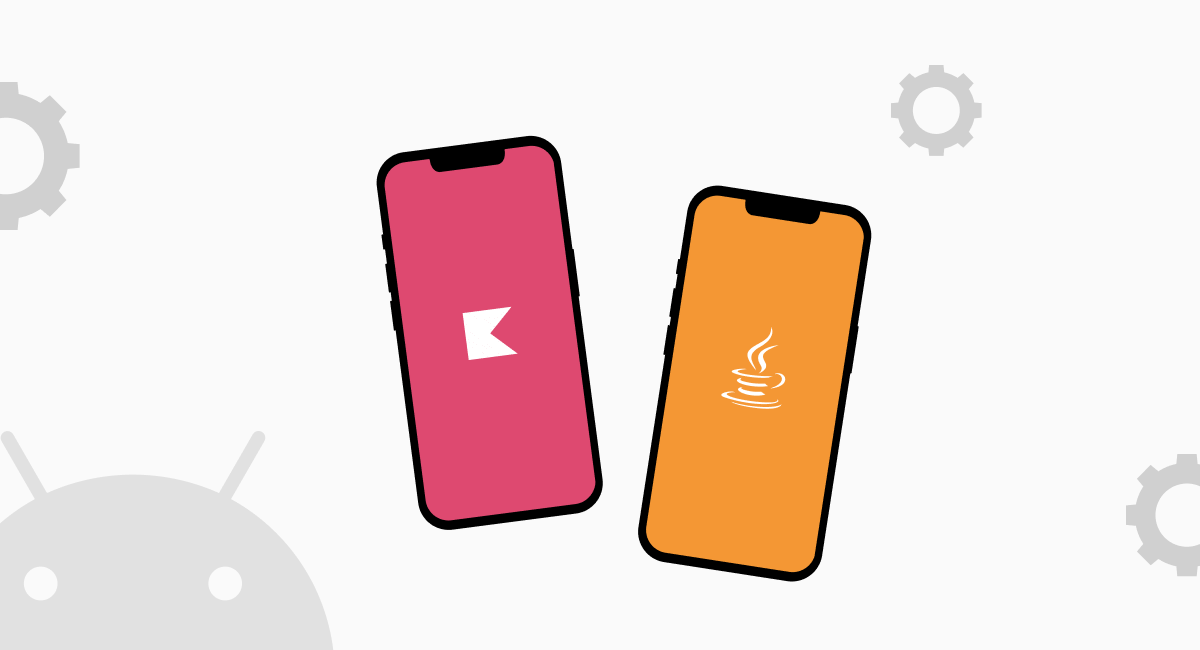Kotlin vs. Java: Comparing the Two Most Popular Languages for Android App Development

Mobile apps have become a crucial part of our everyday life. As per the Statista reports 2023 there was 87 thousand Android apps were released worldwide on Google Play Store, which clarifies that Android is witnessing huge market growth. At the same time, entrepreneurs use such mobile app platforms to grow their businesses digitally. Consequently, when the thing comes to Android app development, the great war of Kotlin vs. Java begins.
Java is the traditional language for Android projects, while Kotlin has earned immense popularity in recent years. Java was around the trend only before the invention of Kotlin. At present, Kotlin had accumulated immense rage when Google itself disclosed that Kotlin is the preferred language for Android apps on the Google Play Store.
After that, it surely raises questions among developers and entrepreneurs about which language to choose for. In this article, we will compare both propagating languages by identifying their pros and cons to help businesses choose the most appropriate tech stacks for their next Android project.
Kotlin vs. Java: Dissimilarities For Android App Development
We all can agree that Java was the most preferred choice to build Android apps in the past, but slowly Java has started to fade this trend with the increasing demand for Kotlin. Here is a brief comparison of both languages that shows their significance in development.
Security Manner
NullPointerException is a well-known error that coders face in Java, as it doesn’t furnish null safety. Kotlin offers built-in null safety features and has a more concise syntax when compared to Java, which means developers can write less code and achieve the same results.
Syntax
One of the key distinctions between Kotlin and Java stands for Syntax. Kotlin carries out a more superficial and more concise syntax, in addition to Java which drives it effortless to read and write codes.
Extension Functionality
Coders can readily extend the operations of an existent class in Kotlin without operating an inheritance from the class. It simplifies that programmers don’t have to implement any modification to the code while adding more functions to the app. In contrast to Java, it does not support extension functions.
Data Classes
In Java, engineers have to set up the variables and have to compose a lot of standard code to build classes for data. Besides this, Kotlin can construct data classes in a few clicks. Engineers only have to retain the data keyword in the class, and the compiler will terminate the task itself.
Object-Oriented Coding
Kotlin involves both functional and object-oriented coding concepts, while java is the more suitable option for OOP. For functional coding, Kotlin sustains high-order operations, lambdas, and function types, while java introduced lambda expression and functional interfaces in Java 8 only, which is still not suitable for functional programming.
Wildcards
In Kotlin vs. Java – Kotlin refrains sustain wildcard classes. On the opposite, Java comes with wildcards. Usually, a wildcard simplifies a question mark that defines a type that’s not familiar. It watches over the type-safety in Java programs.
Coroutine Support
In a heavy Android system, the long-running task may block the thread, which causes an error or crash to the app. To prevent this error, developers come along with a coroutine solution. Kotlin utilizes coroutines to discontinue the implementation of a code and restarts it in an appropriate situation, and it allows all the tasks to run in a single thread.
While Java is far from this, it doesn’t support coroutine. It lets you build considerable threads to handle lengthy functions, but multiple threading increases the circumstances of the glitches on the project. Now let’s overview both coding languages with their major pros and cons that will make the comparison more clear.
An Overview Of Kotlin Language
Kotlin is a statically typed, cross-platform, high-level coding language with a type interface. It was designed by JetBrains that interoperate fully with Java and the JVM version of Kotlin’s standard library.
Advantages of Kotlin
Simple & Easy Learning
Compared to Java, Kotlin has a small number of learning curves to cover. Making it ideal for developers to build platforms in Kotlin with a basic understanding and Android app development experience. Consequently, all the skills that resources have mastered while operating java can be involved in Kotlin.
Smooth Maintenance
Kotlin sustains variable IDEs available in the industry today that ultimately help to enhance developers’ overall productivity as it eliminates the need to learn new IDE for programmers. It again proves the great benefit to leverage by moving forward with Kotlin.
Fewer Bugs
The possibilities of buggy outcomes are extremely less while performing on Kotlin compared to additional coding languages. Moreover, it contains less coding, which results in rarer bugs. Apart from the clear and consolidated codebase, it provides better stable support for production, making it an exemplary choice to go for Kotlin.
Coordinates With Java
Another significant advantage of using Kotlin is that it efficiently coordinates with existing Java code. The conceivable reason is that Kotlin is consistent not only with Java but also with its tools and Android frameworks. It signifies that switching from Java to Kotlin is truly a smooth walkover for developers.
More Reliable
Kotlin stands for the much more mature coding language since it comes into existence. After the invention, Kotlin went into several Alfa and Beta tests before the company launched its final public version, which satisfies the reliability concerns.
Drawbacks of Kotlin
Not Evolved Compared to Java
We all can agree upon one thing Kotlin and java have much more similarities, but somehow Kotlin still differs from Java in a mature manner. Hence it will take some time for developers to get familiar with Kotlin, whereas, for entrepreneurs, it can be a bit costly to train the team.
Slower In Compilation
In certain possibilities, the performance of Kotlin is way quicker than Java, specifically while performing incremental builds. But when the thing is to create clean builds for Android applications, Java remains the best option to go for.
Fewer Learning Statistics
Even though the popularity of Kotlin is growing every day, there are yet narrow learning curves obtainable in the market today. Hence for easy usage of Kotlin, one must have to acquire in-depth knowledge of Kotlin coding language.
Biased Resources For Hire
Besides the high popularity of Kotlin, there are still limited Kotlin professionals available. Especially in such a competitive market, it will be a daunting task for entrepreneurs to find and hire the perfect match of developers for Android app development.
An Overview Of Java Language
Java is a widespread object-oriented, high-level technological stack that was devised by James Gosling in 1995. It was invented to let programmers write code ones that can operate anywhere. From the very first, java stands for the cost-effective plus easy to adapt solution.
Java has been the most operated coding language for over two decades for building mobile apps, business-driven ample data softwares, and so on. Some big brand names, such as Uber, Airbnb, and Amazon, are reported to be using Java on their tech stacks. So yes, for some reason, Java is still satisfying its popularity in the digital industry.
Benefits of Java
Easy to Discover
Java is one of the simple coding languages to learn. Java codes are straightforward and easy to comprehend, making it an ideal pick for anyone who is learning programming for the first time. Java removes all the complex components and drives the implementation way easier.
Object Oriented
One of the paramount advantages of opting for Java is it is an object-oriented programming language. Adapting to the object-oriented theory makes java easier to implement and more secure, which beings helpful in solving real-world problems in Java.
Flexible
Java is a platform-independent and flexible system that doesn’t rely on hardware. Java has a feature of the write ones run everywhere, making it another great advantage to acquire from Java. Simply means one can write codes for once and can run it anywhere.
Multithreading Support
Multithreading is key to gaining maximum CPU utilization, and java endorses multithreading. Java allows running more than one thread at a time. So one can build apps that perform multiple activities at the same time, which is beneficial to improve efficiency.
High Level Plus Secure Language
The java programs are designed in high-level tech stacks, along with a few syntaxes that are simple to understand. Along with that, it uses object-oriented programming concepts such as encapsulation, abstraction, and inheritance, which enhance security and controls unauthorized access.
Drawbacks of Java
Low Performance
Java eats more memory in comparison to other native languages, such as C or C++. Java codes are translated to machine code which causes a big drawback in performance. Also, it supports automatic garbage collection that runs in the backend, which again impacts the performance.
Complex Coding
Applications built with Java can quickly become verbose, containing long and complex passages of code. With Java, programmers have to struggle with verbose and complex syntaxes, which become hard to read and comprehend.
Poor GUI
In Kotlin vs. Java, Java consists of the poor Gui. The GUI builder in Java has poor performance and is unable to build complex UI. There are other frameworks available, but they are not evolved enough to make complex GUI.
Required Licencing
In 2019, Oracle announced a commercial licensing strategy for commercial developers. So the SE 8 version that was free before but now can not be taken into use without paying licensing fees. Hence developers and businesses have to pay fees in order to get all the new updates and features.
Kotln Or Java? What Wil Be Your Pick?
In Android app development trends, Both Kotlin and Java remain the best match solution to build Android projects. Regardless, Kotlin’s tendency is to be more trendy as per the current market trends and is considered to be an efficient alternative to Java for Android solutions.
In comparison to coding functionality, Kotlin has a robust grade of syntax that allows for writing fewer lines of code in contrast to java. So in the codding meaner, Kotlin wins the bait where the code will be simple and easy to understand, which generates better quality and also helps to find bugs and glitches easily.
If we take on the performance note, then Java and Kotlin are both kindly equivalent. But Kotlin is invented to run on the JVM, signifying that performance is comparable, and in some possibilities, Kotlin is much faster than Java.
Kotlin and Java both offer great community support with a wide range of resources. Java is not new in the market. Therefore, it consists of a well-established community, while Kotlin is slightly new; consequently, it doesn’t have a healthy community compared to Java.
Last but not least, Kotlin is the future-oriented technology for Android app development to build quick and error-free projects that will be less complex and with easy maintenance.
Ending Words
From the comparison, we can conclude that Kotlin is a more modern and efficient language in Kotlin vs. Java for Android app development. However, if one is already getting used to Java, then surely it’s not the wrong option to stick with Java. Ultimately it all depends on your personal preferences and project requirements.
Build your next Android project by hiring Kotlin developers from Elluminati; we aim to build robust and qualitative outcomes that derive assured success.



